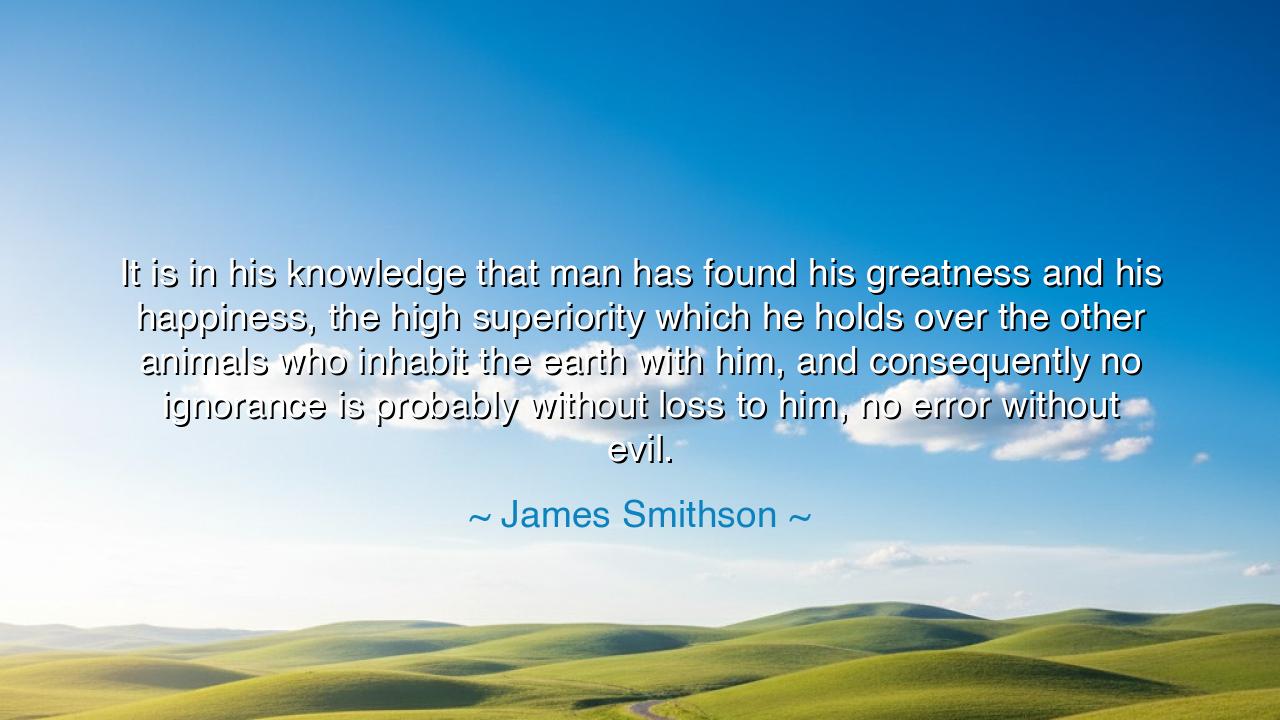
It is in his knowledge that man has found his greatness and his
It is in his knowledge that man has found his greatness and his happiness, the high superiority which he holds over the other animals who inhabit the earth with him, and consequently no ignorance is probably without loss to him, no error without evil.






In the dawn of knowledge and human awakening, James Smithson, the visionary founder of the Smithsonian Institution, declared: “It is in his knowledge that man has found his greatness and his happiness, the high superiority which he holds over the other animals who inhabit the earth with him, and consequently no ignorance is probably without loss to him, no error without evil.” These words stand as both a hymn and a warning—a hymn to the glory of human knowledge, and a warning against the shadows of ignorance. For in this single thought, Smithson captured the very essence of what makes humankind noble: the divine hunger to understand, to seek truth, and to rise beyond instinct into the realm of wisdom.
To Smithson, knowledge is the crown and compass of humanity. It is what separates us from the beasts of the field, not in body, but in spirit. The animals may share our breath, our hunger, and even our cunning, but they do not share our wonder—the restless need to know why the stars burn, why the rivers flow, why suffering exists, and what lies beyond the veil of death. Through knowledge, humankind transforms the chaos of existence into order, the unknown into the understood. It is this very pursuit, he says, that gives man both greatness and happiness, for true joy is found not in ignorance, but in illumination.
Yet with this gift comes a grave responsibility. Smithson warns that every ignorance carries a loss, and every error a form of evil. These are not the moral failings of wicked men, but the natural decay that comes when knowledge is neglected. When humankind turns its back on learning, when curiosity fades and arrogance grows, decline begins. The civilizations of old—Babylon, Rome, and Athens—did not fall merely by sword or fire, but by ignorance: the dimming of inquiry, the silencing of thought. Thus, knowledge is not a luxury of the learned; it is the lifeblood of civilization itself.
Consider the story of Galileo Galilei, who, armed with a telescope and faith in reason, looked to the heavens and dared to proclaim that the Earth was not the center of all things. For this pursuit of truth, he was condemned, humiliated, and silenced. Yet though his body was bound, his discovery broke the chains of ignorance for generations to come. His courage to know—to suffer for knowledge’s sake—became the fire that rekindled the modern world. Galileo lived the very principle Smithson spoke of: that knowledge uplifts the human spirit, while error and ignorance enslave it.
Happiness, Smithson tells us, is not found in comfort or simplicity, but in understanding. The ignorant may live in ease, but their peace is fragile, built upon shadows. The wise, though burdened with the weight of truth, find joy in the harmony of discovery. For knowledge connects man to the cosmos—it reminds him that he is part of something vast, intricate, and divine. In learning, man reclaims his rightful place as both observer and participant in the grand design of creation.
Thus, no ignorance is without loss, for each forgotten truth dims the light of human progress. Every falsehood embraced, every superstition unchallenged, leads not only to individual blindness but to collective decay. When a people cease to question, they cease to grow. Knowledge, like fire, must be fed constantly lest it fade to ash. And those who guard the flame—teachers, thinkers, artists, and seekers—are the quiet heroes of humanity.
Let this be the teaching passed down through the generations: seek knowledge as the highest form of devotion. Let your curiosity be your compass, your mind your altar, and your reason your prayer. Do not fear the effort of learning, nor shy from the discomfort of doubt. For in understanding, there is both greatness and joy—the greatness of rising above mere existence, and the joy of seeing truth with one’s own eyes.
So live, O seeker, as Smithson urged: cast away ignorance, guard yourself against error, and let the light of knowledge guide your days. For in knowing, you fulfill the noblest purpose of your being—to become not merely a creature that lives, but a soul that understands.






AAdministratorAdministrator
Welcome, honored guests. Please leave a comment, we will respond soon